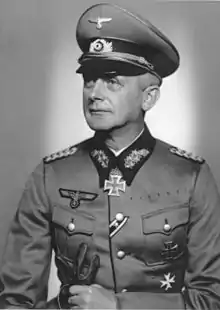Ernst von Leyser
Ernst Ulrich Hans von Leyser (German pronunciation: [ˈeʁnst ˈuːlʁiːx ˈxans fon ˈlaɪsa]) (18 November 1889 – 23 September 1962) was a general in the Wehrmacht of Nazi Germany during World War II who commanded several army corps.
Ernst von Leyser | |
|---|---|
 Ernst von Leyser in 1941 | |
| Born | 18 November 1889 Steglitz, Brandenburg, German Empire |
| Died | 23 September 1962 (aged 72) Garstedt, Lower Saxony, West Germany |
| Allegiance | |
| Service/ | Army (Wehrmacht) |
| Years of service | 1909–45 |
| Rank | |
| Commands held | 269th Infantry Division XXVI Army Corps XV Mountain Army Corps XXI Mountain Army Corps (Germany) |
| Battles/wars | World War I World War II |
| Awards | Knight's Cross of the Iron Cross |
After the war, in 1947, Leyser was tried for war crimes committed in the Balkans and sentenced to ten years of imprisonment during the Hostages Trial; his sentence was commuted to time served and he was released in 1951.
Life
World War II
During the invasion of France, Leyser commanded a regiment. In April 1941 he was appointed commander of the 269th Infantry Division. As part of the Army Group North, the division fought in northern Soviet Union after the launching of Operation Barbarossa. On 18 September 1941 he was awarded the Knight's Cross of the Iron Cross and command of the XXVI Army Corps during the siege of Leningrad.
On 1 December 1942 Leyser assumed command of the XXVI Army Corps. Almost a year later, he was assigned to lead the XV Mountain Army Corps, which was fighting against Yugoslav partisans in Croatia. On 20 July 1944 (coincidentally, the day of the failed assassination of Adolf Hitler) he switched command with General Gustav Fehn, commander of the XXI Mountain Army Corps (Germany) in the Balkans.
On 29 April 1945, he was relieved of command. Leyser was arrested by the United States forces on 8 May.
Trial and conviction

Leyser was tried, as subordinate to General Lothar Rendulic, along with 12 other high-ranking German officers in the Hostages Trial, from 13 May 1947 to 19 February 1948. He was found guilty on two charges of crimes against humanity and war crimes: murder and mistreatment of POWs and murder and mistreatment of civilians. Leyser was sentenced to 10 years of imprisonment in December 1947.[1] On 31 January 1951, John J. McCloy, the US High Commissioner in Germany, revised his sentence to time served.[2]
Death
Leyser died in Garstedt on 23 September 1962, at the age of 73.
Awards
- Iron Cross (1914) 2nd and 1st Class
- House Order of Hohenzollern, Knight's Cross with swords
- Baltic Cross
- The Honour Cross of the World War 1914/1918 with swords
- Clasp to the Iron Cross (1939) 2nd and 1st Class
- Johanittenorden (Ehrenritter)
- Knight's Cross of the Iron Cross on 18 September 1941 as Generalmajor and commander of the 269. Infanterie-Division[3][4]
- German Cross in Gold on 14 April 1943 as General der Infanterie and commanding general of the XXVI. Armeekorps
References
- McDonald, Gabrielle Kirk (2000). Substantive and Procedural Aspects of International Criminal Law: The Experience of International and National Courts: Materials. BRILL. p. 2000. ISBN 90-411-1134-4.
- Kevin Jon Heller (2011). The Nuremberg Military Tribunals and the Origins of International Criminal Law. OUP Oxford. p. 432. ISBN 978-0-19-955431-7.
- Scherzer 2007, p. 504.
- Fellgiebel 2000, p. 290.
Sources
- Fellgiebel, Walther-Peer (2000) [1986]. Die Träger des Ritterkreuzes des Eisernen Kreuzes 1939–1945 — Die Inhaber der höchsten Auszeichnung des Zweiten Weltkrieges aller Wehrmachtteile [The Bearers of the Knight's Cross of the Iron Cross 1939–1945 — The Owners of the Highest Award of the Second World War of all Wehrmacht Branches] (in German). Friedberg, Germany: Podzun-Pallas. ISBN 978-3-7909-0284-6.